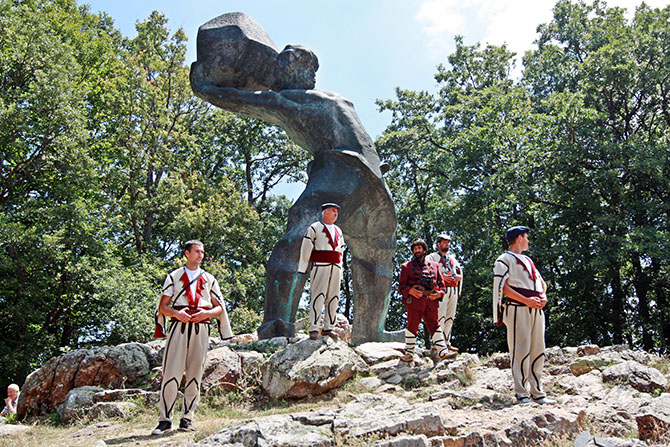Today, the tiny picturesque town of Krushevo turns the wheel of time and relives 1903. Macedonian freedom fighters, known as komiti, parade into town on their horses to the uproaring acclaim of the crowd. The celebrations are all centered around an area known as Bear’s Rock, noted by a large statue of a man throwing a rock. Here, 113 years ago, stood the last line of defense to the Krushevo Republic. Ilinden, or Day of St. Elijah, commemorates the day that Macedonia attempted to overthrow the Ottoman Empire.
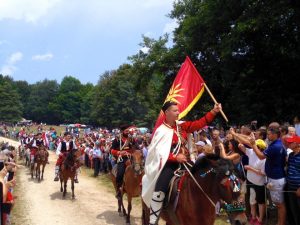
While the rebellions occurred throughout Macedonia, the little town of Krushevo did something remarkable. For 10 days, and 10 days only, they had created the first republic in Europe. Amidst the vast sea of monarchies, Krushevo greeted governance with a breath of fresh air. It embraced its diversity, and created a ruling body comprised of equal representation from every ethnic group. After 500 years of oppression, Macedonians, Albanians, Aromanians, and Jews alike, finally took control over their own destinies. That is what the final battle at Bear’s Rock was all about. Traditionally, it is thought to be the spot where famous Aromanian-Macedonian revolutionary Pitu Guli, along with his company of fighters, died protecting the young republic. The statue is of a fighter using a rock to repel the Ottomans, a last resort after the bullets had run out. Esoterically, it represents Macedonia at that junction in time–Macedonia, the last remaining jewel of the Ottoman Empire, with its rich ports and fertile land, had sustained the Ottoman Empire for centuries. Now, 500 years later, with its knees buckling and arms trembling, it finally shrugged from and overthrew the burden.
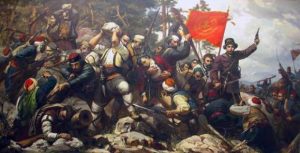
All in all, Ilinden was a premature failure. The Ottomans quickly put down the rebellion and bombarded Krushevo into submission once more. However, what the Ottomans and all autocrats failed to recognize is that ideas cannot be destroyed. The idea behind Ilinden was so particularly strong that it sustained the Macedonian people from the future horror that would be inflicted upon them with the partition of Macedonia. While it is a controversial idea, Macedonian intellectuals and statesmen knew of their ancient origin. Nikola Karev, President of the Krushevo Republic, was even quoted in a Greek newspaper stating that he is a Macedonian and a direct descendent of Alexander the Great. What this signifies is that many Macedonians knew their history, and knew how long they had been under oppression. It was not just the Ottomans they were overthrowing that hot August day–it was every occupation that had occurred. Since the conclusion of the Macedonian-Roman wars in the 3nd century, Macedonia had been under occupation for close to two millennia. However, on the eve of the Ilinden rebellion, a people who should have been lost to the history books, still clung to the idea that Macedonia would finally be liberated, and they would be free to speak their language, attend their place of worship, and dance their music in freedom.
The future would prove a harsh reality for Macedonia. Not only was its freedom denied, but in ten years it would completely disappear from the map; the Treaty of Bucharest saw its forcible partition, while the Greek, Bulgarian, and Serbian governments moved to completely erase the Macedonian people from history. In 1948, in the midst of the Greek Civil War that saw the largest and most brutal exodus of Macedonians in history, the spirit of Ilinden remained. A rare photograph from an abandoned village in Aegean Macedonia shows the words, “Long Live Ilinden, Long Live the Revolution” written on a building wall. This was written at a time when even speaking the Macedonian language was punishable by death. Yet, then as before, Macedonians stared into the face of death and openly defied it. It comes as no surprise that August 2nd was also the date that the Macedonian state finally emerged from the grip of fascism in 1944.
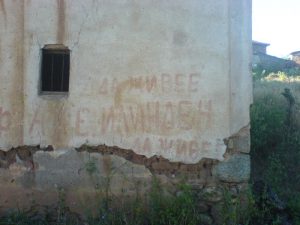
ЖИВЕЕ ИЛИНДЕН” (Long Live Ilinden) in the Aegean Macedonian village of Drenoveni.
While Macedonia may now be divided, and its people oppressed, Ilinden continues to animate and sustain the Macedonian spirit. In Greece, Macedonian villagers proudly celebrated Ilinden in their own unique way—all the while surrounded by Greek police and pressure not to. Goce Delcev famously said that the interests and future of Macedonia are inseparable from the Macedonian people. Today, 113 years after the Ilinden uprising, the attempt to erase the Macedonian identity continues to dominate politics in Greece and Bulgaria. The ideas of invasion and occupation may seem far removed from any sense of reality in the 21st century, but we cannot let ignorance become our ally. As President Ronald Reagan said, we must live knowing that freedom is never more than one generation from being extinct. In the world we live in, freedom is neither a guarantee nor a right. This is what Ilinden teaches us. In truth, it is not one revolution rebelling against one occupation. It is the culmination of all efforts to free Macedonia, as well as the on-going battle to preserve who we are, and ensure our identity and culture survives for the next generation. Our future continues to hang on the hinges, and everyday is our Ilinden. Everyday we will face challenges to rebuke our oppressors, and preserve who we are. However, when push comes to shove, will we be able to unite once more, and do what is needed in the face of overwhelming pressure? The day we forget what Ilinden stood for, is the day we will have finally lost the battle. Today as Macedonians from all over visit the hallowed ground of Bear’s Rock, one can almost hear the voice of all those lost–the wisdom of the ages, reminding us of their sacrifice and dreams. By visiting the site, we not only commemorate their sacrifice, but proudly embrace their struggle.
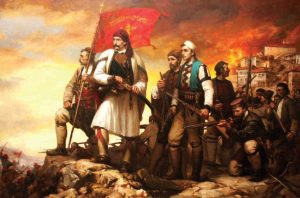
—
The views of the author may not necessarily reflect the views of the United Macedonian Diaspora and Generation M.

